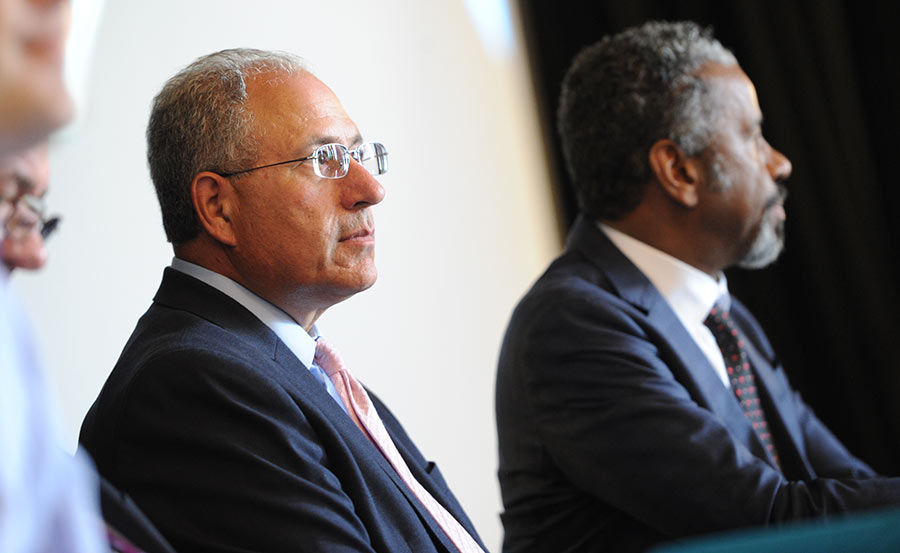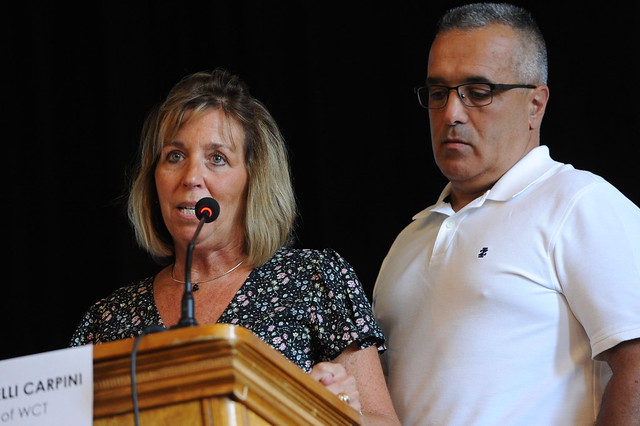In the past several years, members of the Wappingers Congress of Teachers have tried to grapple with the loss of two educators to addiction.
Some are upset they didn’t notice the signs, or weren’t sure what to do when they noticed their peers arriving late for school, or being irritable.
Some are stunned to know the truth.
“Shocking” is how Diane DiChiara, special education English teacher, described feeling about the death of a fellow teacher to addiction. She shook her head in dismay.
“You have to look in their eyes and see how distraught they are,” WCT President Pasquale Delli Carpini said of his colleagues.
In response to members’ concerns, the WCT decided to blow out the hush-hush of shame that often accompanies life-threatening problems of addiction and talk about what it means, how it affects families, and what resources are available. This week, the local union, together with school administrators and the Council on Addiction Prevention and Education of Dutchess County, co-hosted a half-day conversation-changing assembly on the drug addiction epidemic. Speakers, a documentary, and a series of workshops for 1,200 educators, administrators, union leaders, and state and community representatives charged the air with facts and emotion.
“It’s all about the stigma. We wanted to reduce the stigma, so people aren’t afraid to get help,” said DiChiara. That includes taking the time they may need to enter treatment without fear of losing their job.
“Addiction is a disease, not a disgrace,” said a brave Sue DeCosta, a keynote speaker who stood at the podium with her husband Mike to talk to educators. Just nine days before, they had lost their 29-year-old son Michael to the disease after years of struggle. “It is a medical condition masquerading as a physical choice. It wrecks families.”
Removing the stigma and shame can correct common misperceptions, she said. She noted that although she and her husband are active, involved parents who gave their four children many tools, they had not made it safe for him to talk about his addiction.
When they first realized there was a problem, she said they had “no idea of the beast we just encountered.”
In the hushed auditorium, clutching her prepared speech, DeCosta asked teachers and school health professionals to understand the disease enough to suspend judgment of students who are struggling with addiction.
“No one is prepared to raise a child who becomes an addict,” she said.

Andy Pallotta, NYSUT president, was joined on stage at an assembly on addiction in Wappingers Falls by NYSUT secretary-treasurer Philippe Abraham, who oversees social justice initiatives. “With the foundation you’ve laid, we will bring this around the state,” pledged a somber Pallotta.
The language attached to the disease fuels more stigma, explained Elaine Trumpetto, executive director of CAPE of Dutchess County. Addicts are described as either “clean” or “dirty.” Her organization has contracted with the Wappingers district for decades to provide information for educators and students on prevention, education, counseling and recovery services.
The addition of two district-wide programs geared specifically to educators — in 2018 and this week — was about taking action after two educators died from addiction. Teachers are already filling out surveys after this week’s event to help union organizers meet their needs to direct the next event.
DiChiara said that with the union-led workshops and training from Employee Assistance Program for administrators, “We have changed our behaviors” in addressing addiction.
Change the narrative
Speaker John Shinholster of the Virginia McShin Foundation said schools should create an environment where a student grappling with addiction could feel free to openly talk to a teacher or school health care professional, “like you send a kid with a cold to the (school) nurse.”
“Are we ready to be supportive? Are we ready to love them?” he asked.
The stigma of breast cancer has been greatly reduced, he noted, by fundraising walks and open conversations — the same can be done for addiction and alcoholism.
Several speakers spoke about addiction as a disease that changes the pathways in the brain and makes it difficult for people to stop using the drugs. Stopping drugs and getting treatment can help reroute those pathways.

“We need to educate people about the impact (of drugs) on the brain — it changes the brain chemistry … it’s now defined as a chronic brain disorder,” said Rena Finsmith, special education social studies teacher, in a conversation before the assembly.
The impact on the family is also staggering — emotionally, mentally, financially and physically. Wappingers educators screened “The Anonymous People,” a documentary on addiction and recovery, and heard from the filmmaker and an actor.
“This is our black plague,” said Kristen Johnson, an actress and advocate in recovery. Many speakers in the film and on stage talked about how society often imprisons addicts rather than provide recovery treatment.
The illness does not have a cure — but it has a solution.
“Addiction lives in darkness,” Greg Williams, filmmaker, told the group.
NYSUT and its local unions can help light the way to change that.
“With the foundation you’ve laid, we will bring this around the state,” pledged a somber Andy Pallotta, NYSUT president.